Key takeaways:
- Resilience involves adapting to challenges and maintaining composure under pressure, transforming setbacks into opportunities for growth.
- Key strategies for developing resilience include setting realistic goals, embracing a growth mindset, and seeking support from peers and mentors.
- Real-life experiences demonstrate that resilience not only aids individual performance but also fosters a sense of community and shared support among competitors.
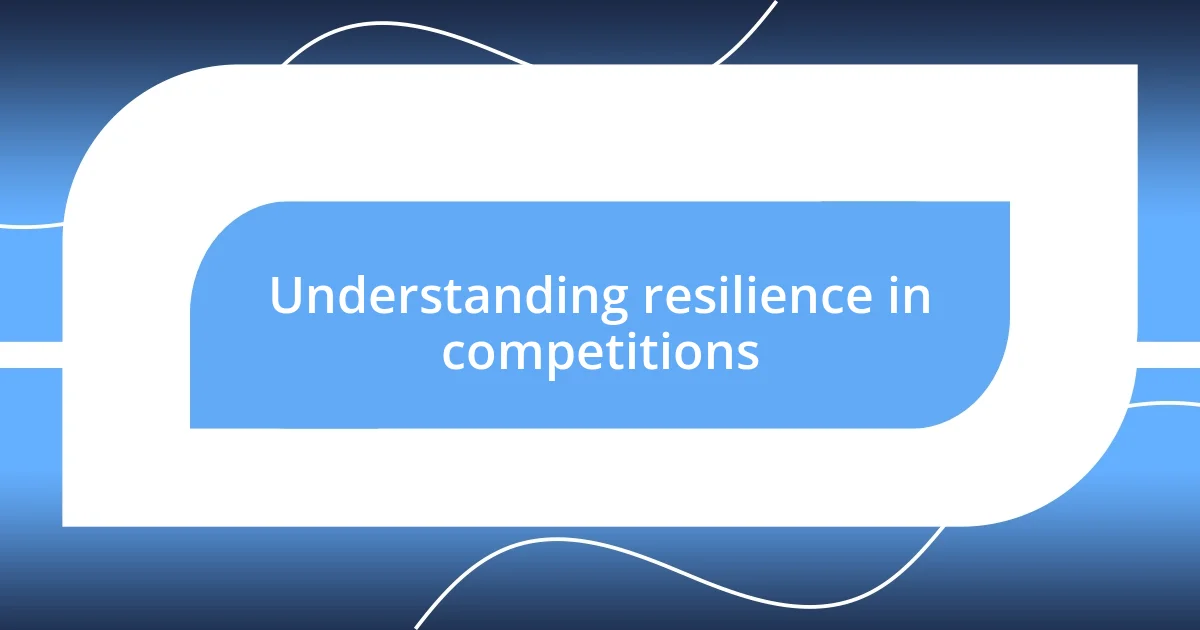
Understanding resilience in competitions
Resilience in competitions is like a muscle that needs to be trained; it’s not just about bouncing back but also about how you adapt to the challenges thrown your way. I remember a time when I faced a significant loss in a tournament. I felt crushed and questioning my abilities. But rather than wallowing in that defeat, I used it as fuel for improvement. Isn’t it fascinating how setbacks can spur growth if we allow them?
Another layer to resilience is the mental fortitude required to stay focused under pressure. During one contest, I noticed how easily my competitors faltered when things didn’t go according to plan. Instead of letting anxiety dictate their performance, I maintained a clear vision of my goals. This taught me that resilience is as much about maintaining composure as it is about responding to external pressures.
Moreover, resilience often involves recalibrating your mindset. When I shifted my view of competition from a win-or-lose perspective to one that values personal growth, everything changed. I genuinely started enjoying the process. It made me wonder, how often do we let fear of failure overshadow our passion? Embracing resilience isn’t just crucial for competitions; it can transform how we approach life’s many challenges.
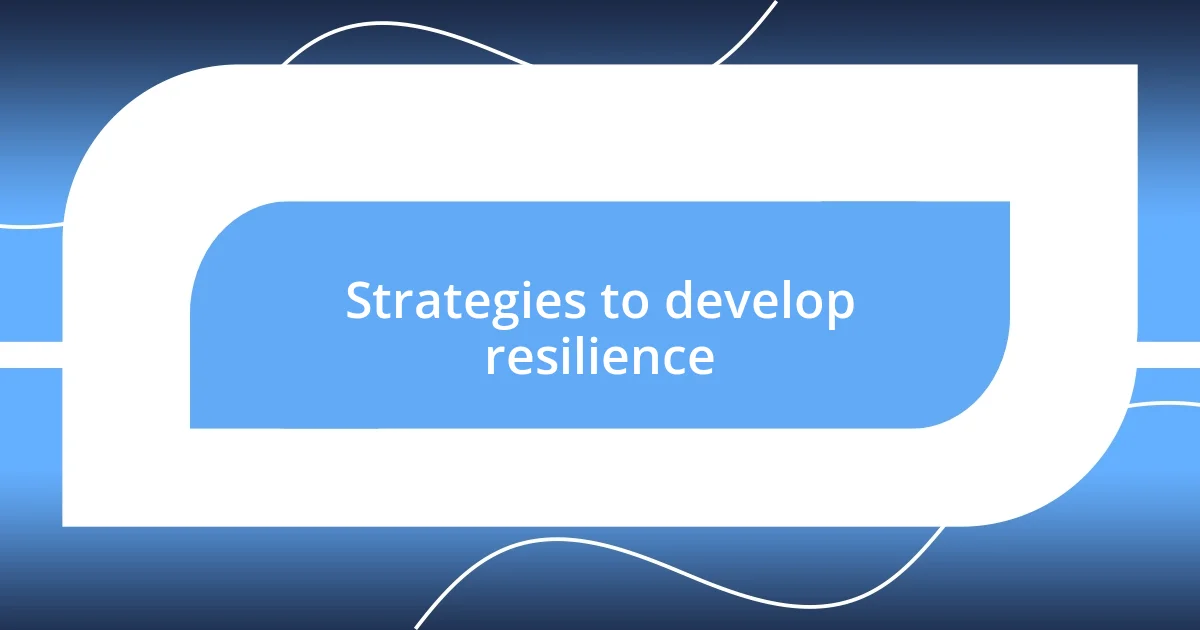
Strategies to develop resilience
To develop resilience, one effective strategy is to set realistic goals. I’ve found that breaking larger objectives into smaller, manageable tasks creates achievable milestones. This way, I celebrate incremental victories, which boosts my confidence. It’s amazing how a series of small wins can build a strong foundation for resilience.
Another strategy involves embracing a growth mindset. I remember preparing for a major event when I encountered a skill I struggled with. Instead of shying away from it, I chose to see it as an opportunity for growth. By focusing on learning rather than merely performing, I noticed a significant shift in my attitude. Isn’t it empowering to view challenges as stepping stones rather than roadblocks?
Finally, I believe that seeking support and feedback plays a crucial role in resilience. When preparing for competitions, I often share my concerns with peers or mentors. Their perspectives can provide invaluable insights that enhance my resilience. It’s comforting to realize that it’s not just me facing the challenges; we can grow stronger together.
| Strategy | Description |
|---|---|
| Set Realistic Goals | Break larger objectives into smaller tasks to create achievable milestones and celebrate incremental victories. |
| Embrace a Growth Mindset | View challenges as opportunities for learning and growth rather than obstacles. |
| Seek Support and Feedback | Engage with peers and mentors to gain insights that strengthen resilience. |
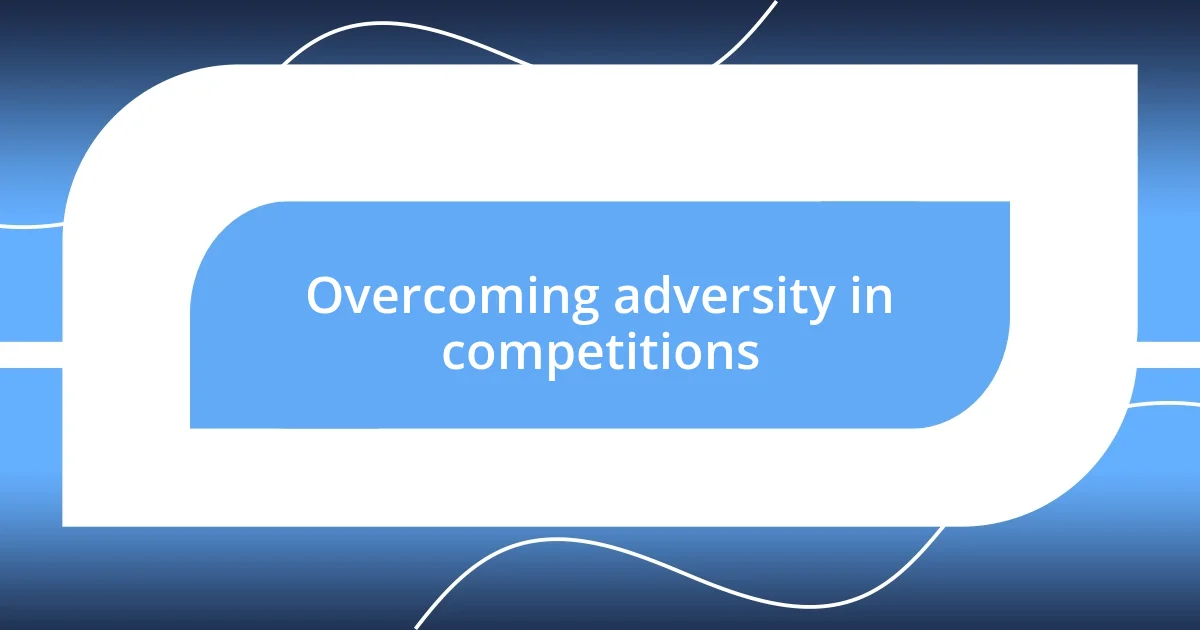
Overcoming adversity in competitions
Struggling through competitions can be incredibly tough. I recall a specific tournament where everything seemed to go wrong. I missed an important shot, and the weight of that failure felt heavy on my shoulders. Instead of letting despair take over, I took a moment to reset. I reminded myself that every champion has faced their share of losses. This experience sparked a turning point for me, highlighting the importance of resilience as a way to reclaim my focus amidst setbacks.
Here are some key insights that helped me overcome adversity in competitions:
- Acknowledging Emotions: Feeling disappointed is normal. Allowing myself to acknowledge those emotions gave me the space to process and move forward.
- Reframing Failure: Instead of viewing failure as the end, I started seeing it as valuable feedback. Each misstep became a lesson in disguise.
- Mindfulness Techniques: Using breathing exercises helped me regain my composure, transforming anxiety into a sense of calm.
These simple yet powerful strategies not only strengthened my resilience but also transformed my entire competition experience. They remind me to keep my head up and embrace challenges as integral parts of growth.
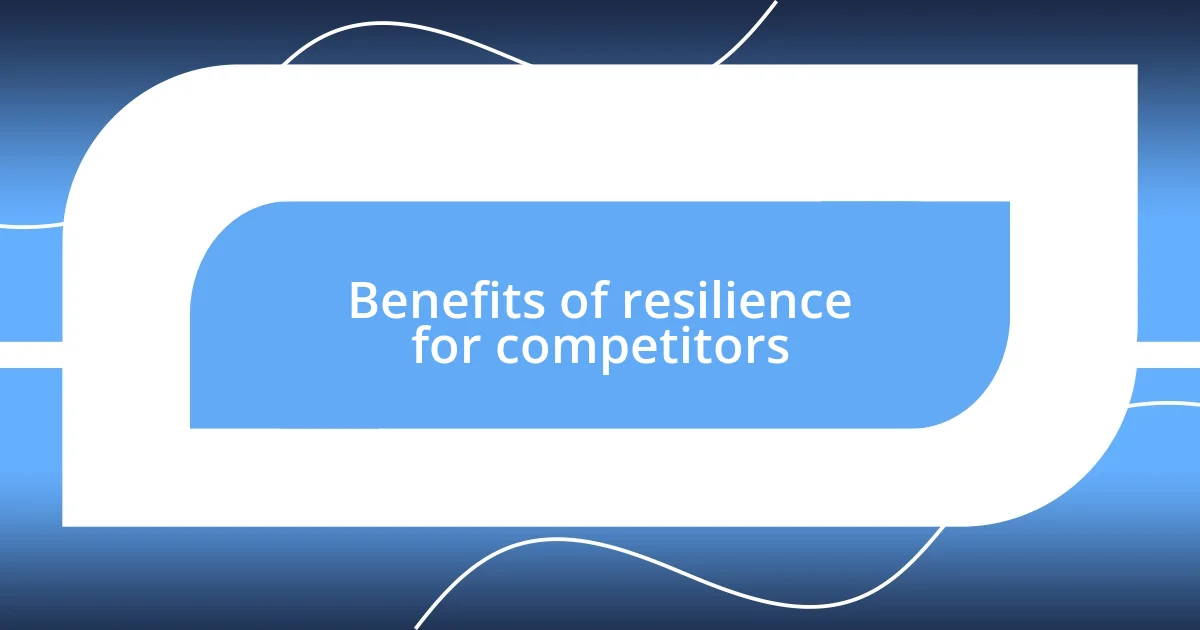
Benefits of resilience for competitors
Resilience in competitions can significantly enhance a competitor’s performance. I remember vividly the feeling I had after a disappointing match; my confidence was shaken, but I realized that bouncing back was what truly mattered. This ability to withstand setbacks not only improves my performance in future competitions but also equips me with the mental strength to face any challenge head-on.
Another benefit I’ve experienced is the development of a deeper understanding of myself. During critical moments, I’ve discovered just how adaptable I can be. It’s fascinating how resilience drives us to evaluate our strengths and weaknesses, prompting growth in ways that I wouldn’t have anticipated. I often ask myself, “What can I learn from this?” and that inquiry leads to profound personal insights.
Finally, resilience fosters a sense of community among competitors. When I share stories of overcoming challenges with fellow athletes, I notice a bond being formed. This shared experience of resilience not only encourages collaboration but also reinforces a culture of support. Have you ever noticed how uplifting it is to realize you’re not alone in your struggles? It transforms competition into a shared journey, making the experience more enriching and less daunting.
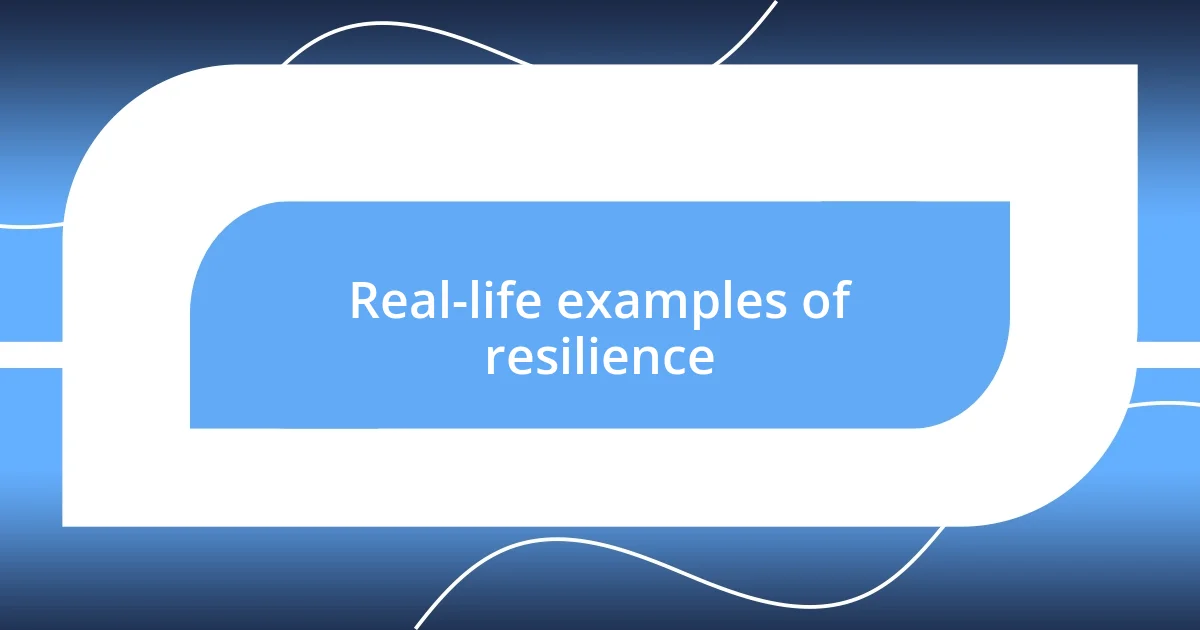
Real-life examples of resilience
One of the most vivid examples of resilience that stands out to me is during a regional wrestling competition. I had trained tirelessly, only to encounter a dislocated shoulder early in my first match. The pain was overwhelming, and I thought, “Is this where it ends?” But instead of giving in to despair, I took a deep breath and focused on my breathing. I could feel my teammates rallying behind me, their encouragement lifting my spirits. Despite the setback, I managed to push through and finish the match. It wasn’t about winning anymore; it was about proving to myself that I could endure adversity, a key moment that solidified my belief in resilience.
Another instance comes to mind from my time as a cross-country runner. I vividly remember a particularly grueling race where I struggled to maintain my pace amid intense fatigue. Halfway through, I thought I might not finish. However, I recalled a mantra from my coach: “The body can quit long before the mind.” That thought ignited a spark within me. I dug deep, finding strength I didn’t realize I had. By the end, crossing that finish line felt less like an accomplishment in victory and more like a celebration of my mental fortitude. Have you ever pushed through a challenge like that and finally felt like your effort paid off?
In team sports, resilience often shines during moments of collective struggle. I remember a basketball game where we were down by twenty points at halftime. The atmosphere was tense; doubt hung in the air. Instead of succumbing to panic, we gathered as a team and shared our fears and frustrations. This open dialogue created an unbreakable bond. With renewed energy, we came back stronger in the second half, ultimately losing, yet feeling victorious for the determination we displayed. How often do we undervalue the power of togetherness in tough times? This experience truly highlighted for me how resilience isn’t just an individual trait; it’s something that can foster a sense of unity in a group.
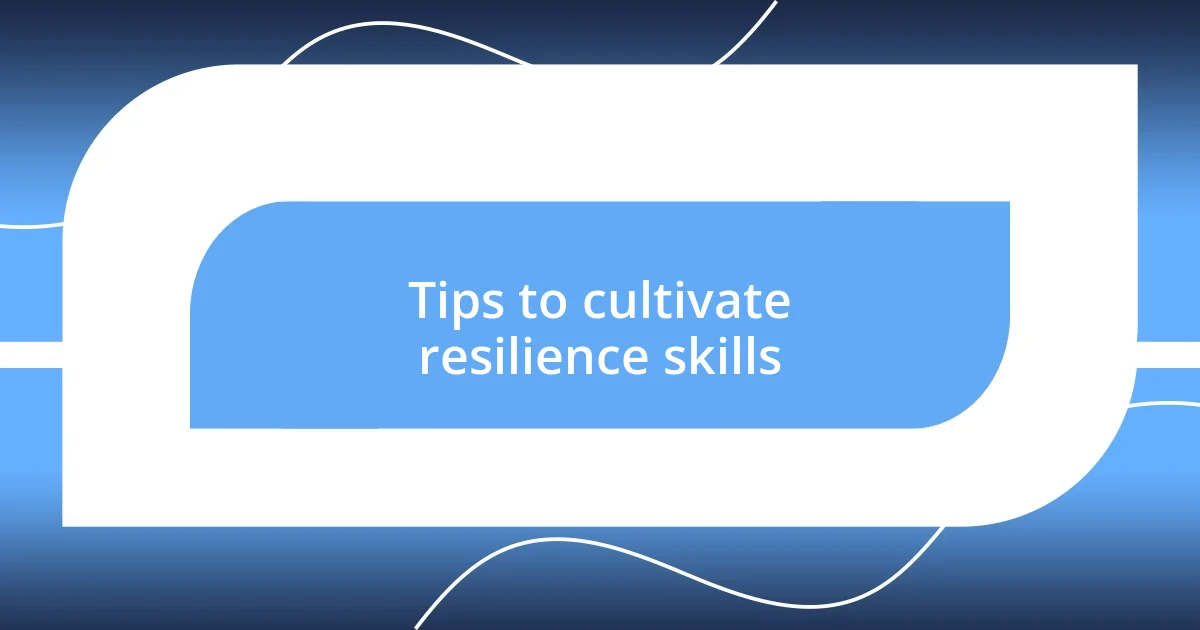
Tips to cultivate resilience skills
To cultivate resilience skills, I’ve found that setting realistic goals is essential. When I aim for achievable targets, I feel less overwhelmed, and it fosters a sense of accomplishment when I reach them. Think about it—how often do we set ourselves up for stress by expecting too much too soon?
Another strategy is to practice mindfulness. I often take a moment to center myself before competitions, which helps me stay present and focused. Just last week, during a particularly nerve-wracking event, I closed my eyes and concentrated on my breathing. That simple act calmed my racing thoughts and allowed me to perform with clarity.
Lastly, surrounding myself with supportive people has been crucial. When I lean on friends and family, I’m reminded that I’m not alone in my journey. After a tough practice session, I often share my feelings with my teammates. Isn’t it reassuring to know that others face similar struggles? That connection somehow makes the load lighter, fostering an environment where resilience can really thrive.














